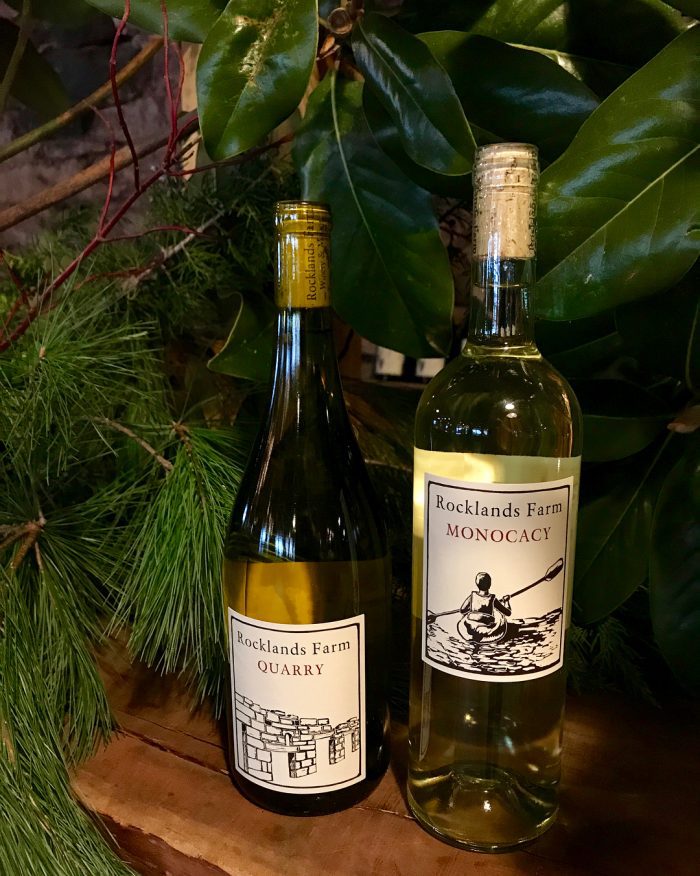Celebrating New Years with Local Wine and Spirits
As you gear up for New Year Eve celebrations, we thought we’d help you think about what kind of local, organic or sustainable wine or cordials could help you ring in the new year.
But, how do you shop your sustainable values at the wine store?
Luckily, Shawn Eubank, co-founder and vice president of sales and marketing at Rocklands Farm and Winery, was able to help guide us in the right direction. Rocklands Farm is located in Poolesville in Montgomery County. They are a Fair Farms partner.
Shawn highlighted two aspects of putting together a perfect bottle of wine — first, the farming piece, followed by the crafting process.
[do_widget id=text-16]
Farming Organic Wine
 Rocklands Winery grows six-and-a-half acres of fruit. In Maryland, they face some key challenges to growing good wine-making grapes. Our climate includes hot, humid summers that can promote disease, followed by frigid winters. For that reason, Rocklands grows hybrid grapes (about one-third of their total grape production). These grapes are hardier and used as a way to deal with the factors of mid-Atlantic growing while limiting the amount of treatment used on the vines and fruit.
Rocklands Winery grows six-and-a-half acres of fruit. In Maryland, they face some key challenges to growing good wine-making grapes. Our climate includes hot, humid summers that can promote disease, followed by frigid winters. For that reason, Rocklands grows hybrid grapes (about one-third of their total grape production). These grapes are hardier and used as a way to deal with the factors of mid-Atlantic growing while limiting the amount of treatment used on the vines and fruit.
Overall, the United States lags in organically-farmed wines — compared to other wine-producing regions, like France. Shawn said that the industry is young and may fear taking what is perceived to be a more high-risk approach.
If you are a Fair Farms consumer who wants to shop sustainably, it is important to support wineries that are taking steps to farm minimally-treated or completely organic wines.
What Consumers Should Know
 The second piece of the process is something that consumers may not be as aware of — what happens to the grape after it is picked but before it ends up as wine on your table.
The second piece of the process is something that consumers may not be as aware of — what happens to the grape after it is picked but before it ends up as wine on your table.
At Rocklands, their priority is highlighting the natural flavor of the grape, specifically, the taste of a grape grown in Maryland. They aim to make high quality wines, from the best grapes, and do not work with fruit juices or concentrates.
Unlike other food products, alcohol does not require a nutrition label, or ingredient list, and the FDA has a pretty lengthy list of additives that are allowed in wine.
Shawn’s advice for pulling back the veil on this process is that you buy your local wines straight from the source. The advantage in Maryland is that you are more likely to see how the wine is made, and engage in a conversation with the winemaker. Do they use pesticides? Chemical additives? Do they add juice blends or concentrates from other sources?
Rocklands offers tastings and tours to encourage this kind of transparency, and to allow more consumer-producer conversations to happen.
If you end up at your local liquor store, Shawn’s best advice is to look for organic wines and check out the importer on the label. Many wine importers work with similar wineries, so if you like a certain organic wine, the importer is likely working with other wines and wineries that align with your values.
Also, talk to your local wine store staff. A knowledgeable wine store will be able to help you answer questions about sourcing, ingredients and flavor.
We hope this demystifies some of the questions you had about wine, and, as always, please drink responsibly (and sustainably).
Rocklands Farm Winery & Market is located in Montgomery County, Maryland about 20 miles northwest of Washington, DC. In addition to handcrafted wines, the market offers pasture-raised meats raised on the farm along with other locally-sourced goods and groceries.
Reprinted with permission of Fair Farms. © Copyright 2017 Fair Farms.




